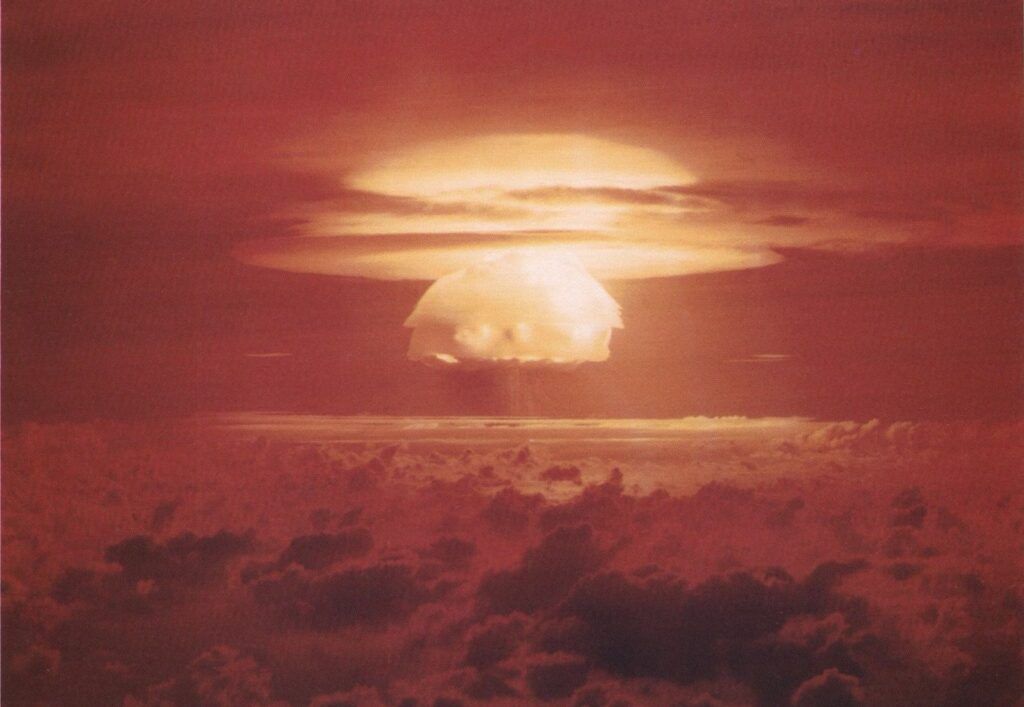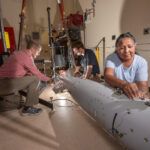A current security imperative: the US role in the Marshall Islands
By Rose Gottemoeller | May 25, 2022
 'Castle Bravo' on March 1, 1954 on Bikini Atoll produced the largest yield and fallout of all US nuclear weapons tests (US Department of Energy).
'Castle Bravo' on March 1, 1954 on Bikini Atoll produced the largest yield and fallout of all US nuclear weapons tests (US Department of Energy).
Eight years ago, I traveled as undersecretary of state for arms control and international security to the Marshall Islands, a remote place in the central Pacific. I was there to commemorate the 60th anniversary of Castle Bravo, the largest and most catastrophic of the 67 nuclear weapons tests that the United States conducted in the Marshalls during the Cold War. Because of a design error that led to a larger-than-expected blast, radioactive fallout from the test—at Bikini Atoll, which had been evacuated—spread over more than 4,000 square miles of the Pacific Ocean and contaminated nearby populated atolls.
I visited the islands to advocate for a total ban on explosive nuclear weapons testing, which modern science makes unnecessary. By contrast, when the US nuclear testing program began in the Marshall Islands in 1946, it was imperative to our national security.
Imperative or not, the United States was intent on protecting the Marshallese from nuclear harm. In a 1947 memo to his secretary of defense, President Truman said that the Marshallese “will be accorded all rights which are the normal constitutional rights of the citizens under the Constitution, but will be dealt with as wards of the United States for whom this country has special responsibilities.”
These responsibilities came under pressure, however, when on March 1, 1954, the Castle Bravo hydrogen bomb detonated with 1,000 times the power of the bomb that destroyed Hiroshima. American military commanders learned before the test that wind patterns risked exposing those living on nearby atolls to deadly nuclear fallout. Nevertheless, they ordered the tests to proceed—blanketing unsuspecting islanders with radioactive debris and unleashing a wave of cancers and birth defects for years thereafter.
One of the Marshallese atolls covered by fallout, Uterik, was called “by far the most contaminated place in the world” by an American official in 1956. The official nonetheless suggested that sending islanders back to Uterik, which had been belatedly evacuated after the 1954 test, would offer an excellent opportunity for scientific research. “It will be very interesting to get a measure of human uptake when people live in a contaminated environment,” he said. “While it is true that these people do not live the way Westerners do, civilized people, it is nevertheless also true that these people are more like us than the mice.”
This history is deeply painful but necessary to understand the current situation in the region.
In 1979, the Marshall Islands became an independent country, and in 1986 adopted a Compact of Free Association with the United States. Under this agreement, and similar agreements with the Republic of Palau and the Federated States of Micronesia, the United States gets military control in exchange for providing these countries with economic assistance and access to some federal programs, such as postal services and school lunches for children. Although lunches might seem like a small change, 35 to 40 percent of children in the Marshalls suffer from poor nutrition. School lunches make a difference.
Competition with China has made these agreements more important than ever to US interests. Recently, China signed a security agreement with the Solomon Islands that set off alarm bells in Washington—and for good reason. Together, the compacts with the three island nations give the US control over an area of the Pacific the size of the continental United States, stretching from Hawaii to the Philippines. They also facilitate US bases, including one in the Marshall Islands that the Joint Chiefs of Staff have called “the world’s premiere range for testing intercontinental ballistic missiles and space operations support.”
The compacts, however, are about to expire, and there have been no formal talks to extend them since the start of the Biden administration. A US policy of refusing to discuss the nuclear issues, inherited from the Trump administration, is partly to blame. The islanders feel the United States is not willing to negotiate on their priorities, and they have a point.
The United States needs these agreements as a matter of national security and can secure them for a fraction of what we are spending to counter China through new weapons and other policies. Instead, the United States has been playing hardball over the nuclear legacy (as well as, bizarrely, the school lunches and postal services), while China offers these countries a blank check.
This strategy stands counter to the foreign policy values that President Biden campaigned on. The agreements present an opportunity to confront China, strengthen alliances, fight climate change, correct racial injustice, and restore America’s standing in the world. President Biden should seize the opportunity to finish the compact extension with the Marshalls, and do so quickly.
The President has begun to put in place a team fully invested with his authority to negotiate on a fast track. The March appointment of Joseph Yun as presidential envoy with responsibility for the Pacific Islands is an excellent step. Now it appears that the negotiations will resume in June, with the goal of completing them before the end of the year.
The White House will have to stay focused to achieve this ambitious goal. The president must give his team clear instructions about what the United States needs out of the negotiations: continuation of military basing rights, of course, but also sensible redress for the nuclear legacy, clear steps that contest Chinese influence, and an initiative to counter the effects of sea rise and climate change.
Getting the negotiations moving should not be difficult. Everyone with knowledge of the situation agrees that the United States needs the compacts extended, and support exists on both sides of the aisle in Congress because it is in the U.S. national security interest to do so. President Biden’s first term has been full of difficult foreign policy decisions, but this need not be one of them.
Together, we make the world safer.
The Bulletin elevates expert voices above the noise. But as an independent nonprofit organization, our operations depend on the support of readers like you. Help us continue to deliver quality journalism that holds leaders accountable. Your support of our work at any level is important. In return, we promise our coverage will be understandable, influential, vigilant, solution-oriented, and fair-minded. Together we can make a difference.















First, Congress must pass a reparations act compensating these hapless people. Next, we must recognize that if every point on Earth is a national security concern of ours we would just go bankrupt.
The Compacts don’t expire, only the economic grants in Title 2 are set to expire in Sept 2023, at least for RMI and FSM. The article is mostly accurate but the angle is disappointing. As a Marshallese who has inherited the US nuclear legacy and felt the pain of the testing impacts via the loss of my mother, the US should simply rectify its outstanding issues and he a good partner because it’s the right thing to do. Security interests should be secondary. I agree with what I think I’m hearing from the author as hope that the Biden Administration… Read more »